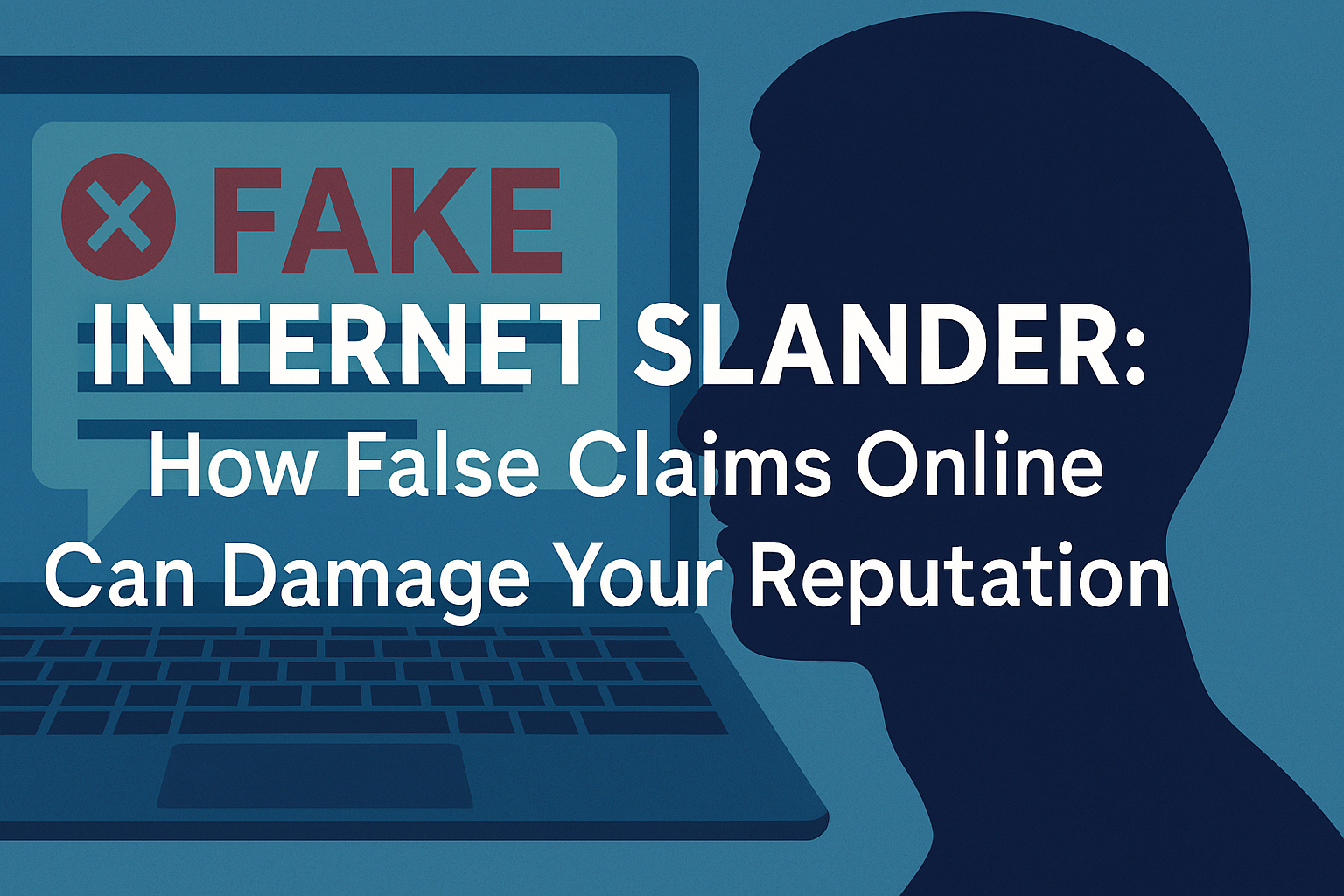Estimated reading time: 5 minutes
Table Of Content
The Real Threat of Internet Slander
False online claims, whether posted on social media, forums, or review sites, can go viral in hours and persist for years. Unlike casual gossip, slander on the internet often becomes permanent unless actively removed or suppressed.
How It Manifests:
- Defamatory tweets and posts
- False accusations on Reddit or Quora
- Fake reviews on Yelp or Glassdoor
- Smear campaigns via blog comments or web forums
This kind of defamation not only spreads misinformation but can also destroy personal and professional lives.
What Qualifies as Internet Slander?
Slander traditionally refers to spoken defamation, but when spoken claims are transcribed or shared online, they may qualify as libel depending on the medium. Nonetheless, the term “internet slander” is commonly used to describe false and damaging statements posted online.
Legal Definition of Slander:
To pursue legal action for slander, a statement must:
- Be false
- Be published or shared with others
- Cause reputational harm
- Be made negligently or with malicious intent
Statements of opinion generally do not qualify, but false statements presented as fact often do.
Libel vs. Slander in the Online World
In many jurisdictions, libel refers to defamation in written or published form. When defamatory speech is recorded (e.g., in a YouTube video or podcast) or transcribed and widely shared, it often falls under libel law. Still, many people use the term “internet slander” interchangeably.
Understanding this distinction is critical for filing legal action because different laws and proof standards may apply.
Real-World Consequences of False Online Claims
1. Career Damage
Job offers may be rescinded or promotions delayed because of a defamatory search result. Employers regularly Google applicants, and defamatory statements—even if false—can cost someone their dream job.
2. Lost Clients and Revenue
Professionals and business owners lose credibility quickly in today’s review-driven economy. A single fake review can damage a restaurant’s sales or an entrepreneur’s hard-earned brand.
3. Emotional Distress
Reputation attacks cause anxiety, depression, and even PTSD in serious cases. The emotional toll of knowing that strangers believe lies about you can be overwhelming.
4. Legal Jeopardy
Defamatory statements can lead to retaliatory lawsuits, especially if false claims involve criminal behavior or serious accusations like fraud, abuse, or harassment.
5. Social Isolation
False claims can cause alienation from friends, colleagues, and social circles. People who don’t know the truth may distance themselves, creating an additional layer of trauma.
What To Do If You’re a Victim of Internet Slander
Step 1: Preserve Evidence
Take screenshots, archive URLs, and document timestamps. Use tools like:
- Wayback Machine
- Print to PDF
- Archive.today
Preserving the original context is crucial for legal and strategic purposes.
Step 2: Identify the Source
Is the post anonymous? Try to gather clues. If legal action is necessary, a subpoena to unmask the user through platform providers or ISPs might be required.
Step 3: Report the Content
Most platforms offer reporting tools. Be clear, professional, and cite platform policies or terms of service.
Step 4: Consult Legal Counsel
Even if you don’t plan to file a lawsuit immediately, a lawyer can advise whether you have a valid claim and help you draft a cease-and-desist letter or settlement demand.
Step 5: Contact Defamation Defenders
We offer personalized strategies to remove or suppress defamatory content, protect your reputation, and monitor future risks.
📩 Get a free evaluation from our team
Legal Recourse for Internet Slander
Defamation Lawsuits
If the statement meets legal criteria, victims may file civil claims for damages. Jurisdictions differ on what qualifies, so legal consultation is key.
Types of Damages:
- Actual Damages: Financial losses, loss of clients, or lost wages.
- General Damages: Non-economic harm like pain, suffering, and loss of enjoyment of life.
- Punitive Damages: Awarded when slander is made with malice or extreme negligence.
Statute of Limitations
Most states allow 1–2 years from the date of publication. Act promptly to preserve your rights.
Anonymity Hurdles
Platforms like Reddit or anonymous blogs may protect posters’ identities. Legal action may require subpoenas and sometimes multiple legal steps to uncover IP addresses or associated emails.
⚖️ Legal precedent supports unmasking anonymous posters if strong evidence of defamation exists.
Proactive Measures to Guard Your Reputation
Online Monitoring Tools:
- Google Alerts: Free tool to monitor mentions of your name.
- BrandYourself: DIY reputation management suite.
- Mention.com: Tracks brand mentions across media, blogs, and social platforms.
Build Positive Content:
- Create and maintain professional profiles on LinkedIn, Medium, About.me, etc.
- Start a personal or business blog using WordPress or Squarespace.
- Secure all social media handles, even those you don’t use actively.
- Get featured in interviews, guest posts, or press coverage.
Suppress the Negative
Search engines prioritize fresh, relevant content. By posting high-authority, optimized content consistently, you can bury harmful links further down the search results.
The Role of Defamation Defenders
We help individuals and businesses fight back against internet slander. Our services include:
- Slander Removal Assistance
- Personal Brand Recovery
- Search Engine Suppression Strategies
- Attorney Referrals and Legal Support
- Review Protection Programs
📩 Contact us today for discreet, professional help.
Frequently Asked Questions
Yes, but it may require subpoenas and court orders to reveal the poster’s identity.
No. Slander must involve false factual assertions, not subjective opinions.
Slander is spoken defamation; libel is written. However, online content can fall under either depending on format.
Google may de-index defamatory content with legal documentation or court orders.
Document everything. Screenshots, URLs, and timestamps are critical. Then consult a legal or reputation management expert.
Generally, slander is a civil issue in the U.S., though some states allow criminal prosecution in extreme cases.
Related Contents:



